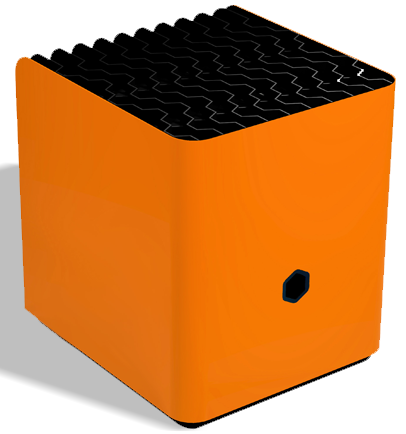Protonet [Is Awesome] Technical
(Warning: some technical stuff mixed in. If you want clarification or more info or whatever, feel free to comment on this post)
Quite a few of my friends don't quite grasp what I'm doing here in Germany, and protonet's public web site doesn't really say much right now (though one of the videos is quite nice). At the lowest level, protonet builds modern hardware and software: hardware in the form of low-power orange cube computers (called "nodes"), and software in the form of a communications platform that ships on these nodes.

My internship at protonet is focused on software development, though I have also helped assemble nodes and set up the software on them. We don't really have actual enforced titles (Tiff's epic title is "Intergalactical President McAwesomeville", my much-less-epic title is "Senior Intern"). We just do what needs to be done.
However, we do tend to work on certain aspects of the project individually based on what we are good at. Tiff tends to work on the interactive frontend, while I develop functionality in the backend(s) and Ali does his thing (talking to clients, answering emails, finding/fixing bugs, administrating servers). Building the hardware is a group project though.
So what actually is protonet?
These orange boxes are essentially really fancy routers. Though our products can be used in pretty much any environment, I'll just talk about the home usage for now. You can get a node and replace your router with it, and then it serves your wifi and files while giving you a fancy communications system. Use it to communicate with friends, family, roommates, whatever. You can allow certain people who don't use your Internet connection to remotely use your node to keep in touch or share files with you, and there are also public channels that anyone with a node can join. The underlying principle is that you own your data: it's sitting in that orange box. It's not somewhere in Facebook's databases where bad stuff can happen to it and bad people can possibly get their hands on it.
That;s not the entire story, though. A node will do a lot more than just transfer files and messages. We are working on a Marketplace-style system where a node owner can quickly and easily install apps on their node. Apps will be able to do a large range of things: manage downloads, stream media, play music from the node itself (think an office radio), display weather/stocks, present polls to users, handle email, pretty much anything.
When you consider that a high-end node can ship with 2TB of disk space, with RAID redundancy to protect against data loss, it can store lots of media. One in that price bracket would also be able to run your home theater at the same time. I;m probably going to end up using mine to play video games, because you can basically install anything on one if you know what your doing.
The software that ships with the node will eventually be open-sourced (when we deem it ready). It runs under Ubuntu Linux, but is also capable of being run (with some limitations) under OS X. With that being said, the easiest way to use it is to simply buy a node, plug it in to an outlet and your modem, and press the hexagon-shaped power button on the front. We like one-button architecture, from powering your node on to setting it up, from inviting users to installing new apps from the market.
Made it to the end? Okay, good (skipping to the end doesn;t count). I probably lost a bunch of people when I started using big words like "database", "redundancy", and "architecture". And to answer many people's initial questions about what I'm actually working on so far, I'm writing file management methods for the Node.JS backend. Sounds boring in comparison, doesn't it? Ah, Computer Science :)
citizen:
I'm still slightly confused, but I think I get it. Regardless, it seems impressive and the design is minimalist. I want one!(Keep up the good work, btw)
phillymac:
Viva la protonet
danopia:
@Citizen: I still don't know who you are :) Anything that you don't understand in particular?
david:
Yes, @Citizen, explain.
daveorigami:
So will it have strong protection from hackers?
tiff:
@daveorigami Good question.Protonet is using advanced industry standards (including WPA2, SSL and SSH), which are for example also used by US govermental institutions.
antwort42:
Would be nice: a Product-Oberview-Screen (Chart) on the website… all what you described in blog in a graphical-form.